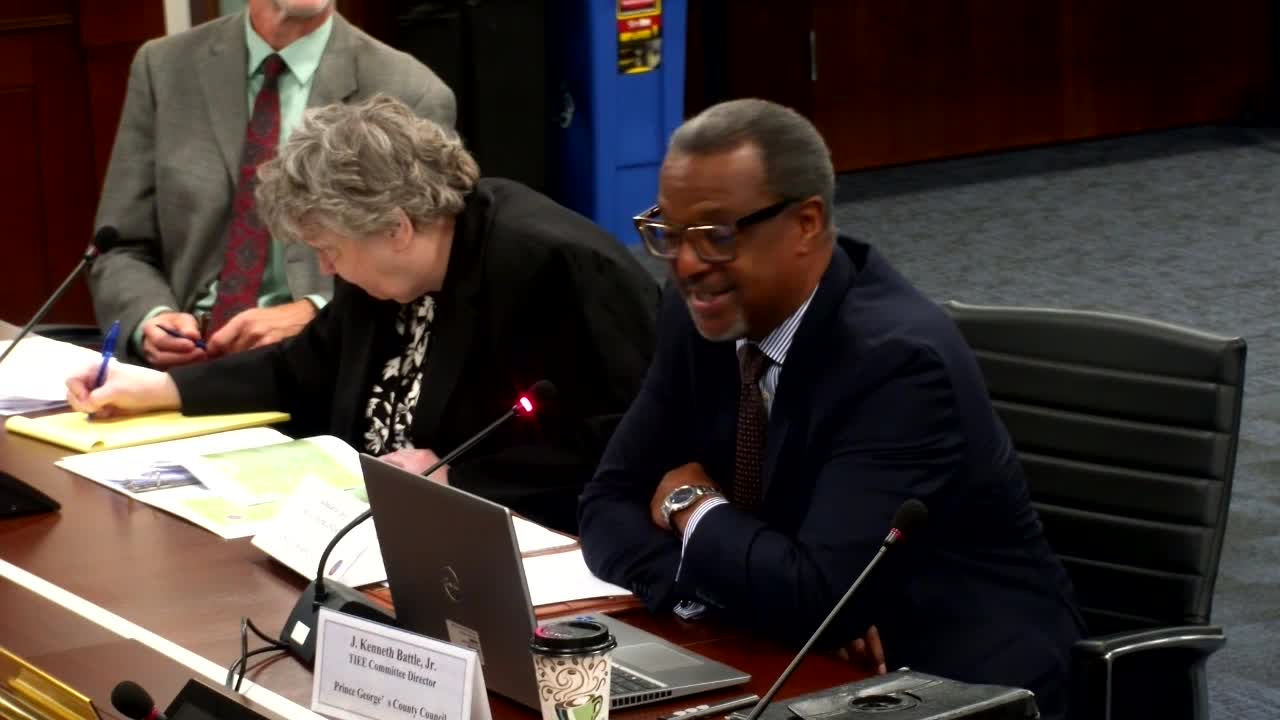County staff outline plan to finalize climate action plan, seek deeper land‑use and equity work
Get AI-powered insights, summaries, and transcripts
Subscribe
Summary
Department of Environment officials briefed the Transportation, Infrastructure, Energy and Environment Committee on the county’s Climate Action Plan and implementation strategy, previewing a Nov. 20 leadership summit, employee training, resilience hubs and a plan to finish five remaining implementation strategies in FY26.
Department of Environment officials on Thursday briefed the Transportation, Infrastructure, Energy and Environment Committee on the county’s Climate Action Plan (CAP) and the Climate Action Implementation Strategy Plan (CASP), laying out FY26 implementation priorities and a recommended near-term release of the CAP while finishing five remaining implementation strategies.
Katie Dickinson, the county’s climate action officer, summarized the department’s near-term work: a Brave Boy Climate Leadership Summit on Nov. 20 at Prince George's Community College; a Climate 101 interactive training (about 30 minutes) that the department plans to make mandatory for county employees pending approval; development of two resilience hubs (Hyattsville Library and the Colin Powell Academy); and an interagency committee (ICC) formed in May 2025 to coordinate cross‑agency implementation.
DOE said the CAP’s goal is to reduce countywide greenhouse‑gas emissions 50% by 2030 from 2005 levels. Metropolitan Washington Council of Governments (COG) greenhouse‑gas data show a 28% reduction as of 2023, leaving roughly a 22% reduction to achieve in five years if the CAP goal is to be met. DOE said transportation is a large driver of current emissions and identified priorities including transit‑oriented development, electric‑vehicle adoption and greening county operations.
Officials said the CASP is a practical, agency‑focused roadmap that the county executive must approve before public release. The DOE presentation noted 12 of 17 total implementation strategies in the CASP have been developed and approved by the earlier task force; staff are working in FY26 to complete the remaining five — specifically trees, land use, renewables, building codes and standards, and one other strategy. DOE staff told the committee they plan to release the CAP in its current form (with the 12 completed strategies) to make the material available to municipalities and other stakeholders and will issue an updated version when the remaining strategies are finalized.
Council members asked detailed follow-up questions about timing for council review, the land‑use strategy (members said council should be “front and center” on land use), the approach to transit‑oriented development and floodplain constraints, and how DOE plans to engage immigrant and younger residents. Council members pressed for a clear schedule to review the CAP and called for DOE to provide drafts of the CASP and climate‑ready budget templates that agencies are using to identify climate‑related projects for FY27.
Agency staff explained they are working with other county offices — including the Office of Central Services (OCS), the Office of Management and Budget (OMB) and the Maryland Energy Administration (MEA) — on grant applications and programs to support building retrofits, EV infrastructure and renewables (DOE said it is coordinating a competitive application for MEA’s Local Government Energy Modernization program). Staff said BEPS benchmarking work has identified large county buildings for investment‑grade audits and that DOE and OCS are coordinating on funding and program applications.
Several council members urged DOE to make the CAP and CASP actionable for the private sector — including concrete incentives or proposed legislation to support transit‑oriented development — and to collaborate with departments such as parking planning and economic development. DOE said it will continue to engage the council in drafting remaining strategies and will work to incorporate council input on land use and equity.
No committee vote or formal action was recorded on the CAP briefing; staff asked to return with additional materials, drafts and a timeline for formal council consideration.
